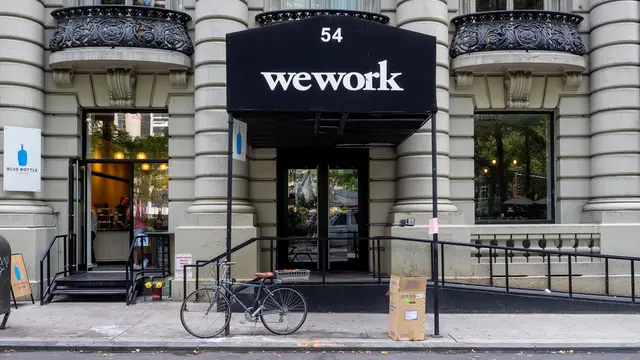
Apr 12, 2023 • WeWork
WeWork's Spectacular Fall: Hubris, Mismanagement & Comic Tragedy
From Co-Working Revolution to Financial Folly. #WeFail

In the annals of corporate history, few stories are as riveting and as ludicrous as the rise and fall of WeWork. Once the darling of Silicon Valley, WeWork's meteoric rise to the status of a "unicorn" was nothing short of breathtaking. Led by its enigmatic CEO, Adam Neumann, the company's hubris knew no bounds, and it seemed like the sky was the limit for this disruptive co-working juggernaut.
But as it turns out, WeWork's business practices were as shaky as the wobbly chairs in their offices. The company's financials were a train wreck waiting to happen. In its IPO filing, WeWork revealed a jaw-dropping $900 million in losses for 2018, with no clear path to profitability in sight. Yet, Neumann brushed off the numbers with the nonchalant attitude of a carefree toddler, seemingly oblivious to the impending storm clouds.
Neumann's hubris was palpable in his grandiose visions and extravagant lifestyle. He portrayed himself not just as a CEO, but as a visionary leader who was going to change the world. He flaunted his eccentricities, from his penchant for tequila shots during company meetings to his grand plans of building a utopian society where people would "live, work, and play" in WeWork spaces. It was as if he believed he was the Steve Jobs of the co-working world, but with a much higher tolerance for alcohol.
But while Neumann was busy playing king of the co-working hill, WeWork's fundamental flaws were becoming more apparent. The company's aggressive expansion strategy, fueled by an insatiable appetite for funding, led to an overvalued and overleveraged empire built on a foundation of sand. It was like a reckless gambler going all-in on a losing hand, blinded by their own arrogance and ego.
WeWork's implosion was as swift as it was spectacular. Its IPO plans, once the most eagerly anticipated event in the tech world, went up in smoke like a malfunctioning smoke machine at a failed rock concert. Its stock price, once the envy of Wall Street, tanked faster than a downhill skier on a sheet of ice. The company's valuation, once touted as the next big thing in real estate, was slashed to a fraction of its former glory.
The fallout was both tragic and comic. Neumann was ousted, and WeWork's image went from cool and cutting-edge to laughable and cringe-worthy. The company became the butt of jokes and memes, with comparisons to failed dot-com era companies and cautionary tales of corporate excess. It was a classic case of "too big to fail" becoming "too big to believe."
In hindsight, WeWork's fall from grace was not just a result of financial mismanagement, but a culmination of hubris, ego, and a detachment from reality. It was a cautionary tale of a company that lost its way, intoxicated by its own hype and ignoring the basic principles of sound business practices.
WeWork's story serves as a stark reminder to aspiring entrepreneurs and CEOs of the dangers of hubris in the business world. It's a lesson in the perils of disregarding financial fundamentals, ignoring warning signs, and becoming disconnected from reality. No amount of bravado, charisma, or grandiose visions can replace sound business acumen, prudent financial management, and a humble approach to success.
In conclusion, WeWork's spectacular fall from grace was a tragicomedy of epic proportions. It was a cautionary tale of hubris and financial mismanagement, wrapped in a cloak of arrogance and comic absurdity. Neumann's over-the-top persona and WeWork's reckless business practices created a perfect storm that ultimately led to the company's downfall. As the dust settled, WeWork's stock price lay in ruins, its IPO dreams shattered, and its reputation in tatters.
So, let WeWork's tale be a sobering reminder to all who dare to dream big in the business world: Keep your feet firmly planted on the ground, your eyes on the financials, and your ego in check. Otherwise, you might just find yourself as the punchline of a cautionary tale, with your stock price in freefall, and your once mighty empire reduced to a footnote in the annals of corporate history.

